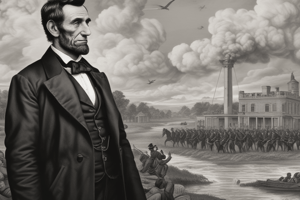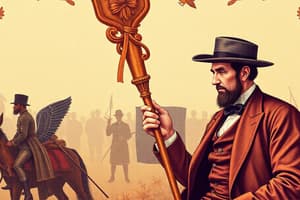Podcast
Questions and Answers
Which states were excluded from the Emancipation Proclamation?
Which states were excluded from the Emancipation Proclamation?
- Delaware, Missouri, Kentucky, and Maryland (correct)
- Illinois, Michigan, Ohio, and Indiana
- Virginia, New Orleans, Boston, and New York
- Texas, California, Florida, and Georgia
What was one of the main goals of the Emancipation Proclamation?
What was one of the main goals of the Emancipation Proclamation?
- To free all enslaved people in the United States
- To increase the number of troops in the Union military (correct)
- To declare war on European countries
- To reduce the economic power of the Confederacy
Approximately how many enslaved people were freed from slavery because of the Emancipation Proclamation?
Approximately how many enslaved people were freed from slavery because of the Emancipation Proclamation?
- 15,000
- 50,000
- 20,000 (correct)
- 10,000
What is the significance of the Emancipation Proclamation in the United States?
What is the significance of the Emancipation Proclamation in the United States?
What was another goal of the Emancipation Proclamation?
What was another goal of the Emancipation Proclamation?
Why was the Emancipation Proclamation important for the Union?
Why was the Emancipation Proclamation important for the Union?
What was a consequence of the Emancipation Proclamation?
What was a consequence of the Emancipation Proclamation?
What is true about the Emancipation Proclamation?
What is true about the Emancipation Proclamation?
What was a result of the Emancipation Proclamation?
What was a result of the Emancipation Proclamation?
Why is the Emancipation Proclamation considered important?
Why is the Emancipation Proclamation considered important?
Where would the Emancipation Proclamation have the most impact?
Where would the Emancipation Proclamation have the most impact?
What was a major outcome of the Emancipation Proclamation?
What was a major outcome of the Emancipation Proclamation?
Why was the Emancipation Proclamation a significant step towards abolishing slavery?
Why was the Emancipation Proclamation a significant step towards abolishing slavery?
What was one of the benefits of the Emancipation Proclamation for the Union?
What was one of the benefits of the Emancipation Proclamation for the Union?
What was a limitation of the Emancipation Proclamation?
What was a limitation of the Emancipation Proclamation?
What was the Emancipation Proclamation's impact on the Civil War?
What was the Emancipation Proclamation's impact on the Civil War?
What was the Emancipation Proclamation's significance in American history?
What was the Emancipation Proclamation's significance in American history?
How did the Emancipation Proclamation affect enslaved people?
How did the Emancipation Proclamation affect enslaved people?
What was Lincoln's goal in issuing the Emancipation Proclamation?
What was Lincoln's goal in issuing the Emancipation Proclamation?
What was the Emancipation Proclamation's impact on the Confederacy?
What was the Emancipation Proclamation's impact on the Confederacy?
Flashcards are hidden until you start studying
Study Notes
Emancipation Proclamation
- Issued by President Abraham Lincoln on January 1, 1863
- Stated that "all persons held as slaves...shall be then, thenceforward, and forever free"
- Only applied to states that had seceded from the United States
Goals of the Emancipation Proclamation
- To increase the number of soldiers in the Union army
- To limit the Confederate army's manpower
- To provide a sense of morality to the purposes of the war
Text of the Emancipation Proclamation
- Declared that enslaved people in rebellious states were free
- Recommended that freed people work for reasonable wages
- Allowed freed people to join the armed services
Reasons for the Emancipation Proclamation
- To weaken the Confederate army
- To gain support from Europe by associating the Union with the abolition of slavery
- To strengthen the Union's moral cause
Background to the Emancipation Proclamation
- The American Civil War was fought between the Northern and Southern states over slavery and states' rights
- Seven Southern states seceded from the United States and formed the Confederacy
- The Union, led by President Lincoln, fought to preserve the Union and end slavery
Abraham Lincoln's Position on Slavery
- Personally opposed to slavery, but prioritized preserving the Union
- Believed that slavery was morally wrong, but did not initially prioritize its abolition
Controversy and Debate Surrounding the Emancipation Proclamation
- Criticized for not abolishing slavery completely
- Criticized for not applying to border states
- Opposed by "Copperheads" who believed it would hinder reconciliation between the regions
Effects of the Emancipation Proclamation
- Allowed African Americans to enlist in the Union army
- Connected the fighting of the Civil War to the abolition of slavery
- Did not immediately free all enslaved people, but paved the way for the eventual abolition of slavery
Legacy of the Emancipation Proclamation
- Considered one of the most important historical documents in the United States
- A crucial step towards the abolition of slavery in the United States
- Helped the Union win the Civil War and strengthened the moral cause of the war
Emancipation Proclamation
- Issued by President Abraham Lincoln on January 1, 1863
- Stated that "all persons held as slaves...shall be then, thenceforward, and forever free"
- Only applied to states that had seceded from the United States
Goals of the Emancipation Proclamation
- To increase the number of soldiers in the Union army
- To limit the Confederate army's manpower
- To provide a sense of morality to the purposes of the war
Text of the Emancipation Proclamation
- Declared that enslaved people in rebellious states were free
- Recommended that freed people work for reasonable wages
- Allowed freed people to join the armed services
Reasons for the Emancipation Proclamation
- To weaken the Confederate army
- To gain support from Europe by associating the Union with the abolition of slavery
- To strengthen the Union's moral cause
Background to the Emancipation Proclamation
- The American Civil War was fought between the Northern and Southern states over slavery and states' rights
- Seven Southern states seceded from the United States and formed the Confederacy
- The Union, led by President Lincoln, fought to preserve the Union and end slavery
Abraham Lincoln's Position on Slavery
- Personally opposed to slavery, but prioritized preserving the Union
- Believed that slavery was morally wrong, but did not initially prioritize its abolition
Controversy and Debate Surrounding the Emancipation Proclamation
- Criticized for not abolishing slavery completely
- Criticized for not applying to border states
- Opposed by "Copperheads" who believed it would hinder reconciliation between the regions
Effects of the Emancipation Proclamation
- Allowed African Americans to enlist in the Union army
- Connected the fighting of the Civil War to the abolition of slavery
- Did not immediately free all enslaved people, but paved the way for the eventual abolition of slavery
Legacy of the Emancipation Proclamation
- Considered one of the most important historical documents in the United States
- A crucial step towards the abolition of slavery in the United States
- Helped the Union win the Civil War and strengthened the moral cause of the war
Studying That Suits You
Use AI to generate personalized quizzes and flashcards to suit your learning preferences.




